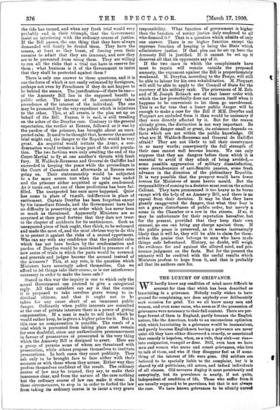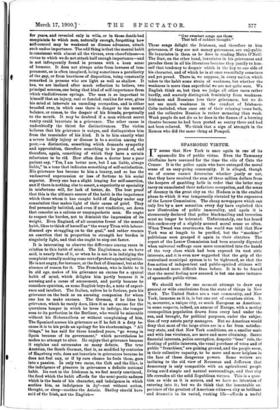THE LUXURY OF GRIEVANCE.
WE hardly know any condition of mind more difficult to account for than that which has been described as luxuriating in a grievance. Nobody really wishes to have ground for complaining, nor does anybody ever deliberately seek occasion for grief. Yet we all know many men and women, and even some races, who seem as if the possession of grievances were necessary to their full content. There are per- haps fewest of them in England, partly because the English nature, like the American, tends to an unconscious optimism with which luxuriating in a grievance would be inconsistent, and partly because Englishmen having a grievance are never quiet till they have either discovered a remedy, or ascertained that remedy is hopeless, when, as a rule, they sink—or rise— into resignation, tranquil or dour. Still, even here we have men and women who nurse and cosset grievances, who love to talk of them, and who if they disappear feel as it some- thing of the interest of life were gone. Old soldiers are believed to be specially liable to the complaint, but it is shared by old politicians, old actors, and indeed individuals of all classes. Old servants display it most persistently and annoyingly, but its prevalence is nearly, if not quite, independent of condition of life. Those who suffer from it are usually supposed to be garrulous, but that is not always the case. We have known grievances to be silently nursed for years, and revealed only in wills, or in those death-bed complaints to which men. naturally enough, forgetting how self-control may be weakened as disease advances, attach such undue importance. The odd thing is that the mental habit is consistent with almost all the virtues, even cheerfulness—a virtue to which we do not attach half enough importance—and is not infrequently found in persons with a keen sense of humour. It does not always arise from lowness of tem- perament, as is often imagined, being sometimes a peculiarity of the gay, or from heaviness of disposition, being constantly remarked in persons who are light as well as shallow. It has, we are inclined after much reflection to believe, two principal sources, one being that kind of self-importance from which vindictiveness springs. The man is so important to himself that an injury, real or fancied, rankles for ever, gives his mind at intervals an unending occupation, and is either brooded over, in which case there is danger to the mental balance, or comes, to the despair of his friends, perpetually to the mouth. It may be doubted if a man without secret vanity could luxuriate in a grievance. The other cause is undoubtedly the thirst for distinctiveness. The victim believes that his grievance is unique, and distinguishes him from the remainder of his kind. It is to him exactly what a severe bodily injury or disease is to a section among the poor,—a distinction, something which demands sympathy and appreciation, therefore something to be proud of, and therefore, again, something of which they have a certain reluctance to be rid. How often does a doctor hear a poor patient say, "Yes, I am better now, but I am liable, always liable," in a tone that indicates something of self-satisfaction. His grievance has become to him a luxury, and so has the undeserved supersession or loss of fortune to his social superiot. Every one has a slight longing for self-assertion, and if there is nothing else to assert, a superiority or speciality in misfortune will, for lack of better, do. The best proof that this is the ultimate source of the habit is the impatience which those whom it has caught hold of display under any consolation that makes light of their cause of grief. They feel personally belittled, and even if not vindictive, set down that consoler as a callous or unsympathetic man. He ought to respect the burden, not to diminish the impression of its weight. Even England, of all countries freest of the mental habit, likes to think of herself as " the weary Titan with labour- dimmed eye struggling on to the goal," and rather resents an assertion that in proportion to strength her burden is singularly light, and that she ought to step out faster.
It is interesting to observe the difference among races in relation to this habit of mind. The Englishman, as we have said, is nearly free of it, or when he is not is in indulging the complaint usually making some sort of protest against injustice. He is not angry, for instance, at the fact of dismissal, but at the absence of reason for it. The Frenchman, who is liable to it in old age, makes of his grievance an excuse for a cynical habit of mind, which delights him partly because it is amusing and a cause of amusement, and partly because he considers cynicism, as some English boys do, a note of experi- ence and intellect. The Italian, unless he is furious, pats his grievance on the back as an amusing companion for whom one has to make excuses. The German, if he likes his grievance, which he rarely does, likes it as an excuse for the querulous temper in which he loves to indulge, the temper seen to its perfection in the Berliner, who would be miserable without his Hohenzollern or without complaining of him. The Spaniard nurses his grievance as if he felt it a duty be- cause it is to his pride an apology for his shortcomings. "All things," he has said for three hundred years, "go wrong in Spain because of its government," which nevertheless he makes no attempt to alter. He enjoys that grievance because it explains and extenuates so many defects. The true Austrian, the South German, that is, as modified by centuries of Hapsburg rule, does not luxuriate in grievances because he does not feel any, or if by rare chance he feels them, goes into a passion. In only two races, the Celt and the Slav, is the indulgence of pleasure in grievances a definite national habit. Its root in the Irishman is, we feel nearly convinced, the food which the habit affords for the semi-poetic sadness which is the basis of his character, and indulgence in which soothes him, as indulgence in kef—rest without action, thought, or sleep—soothes the Asiatic. Shelley should have said of the Irish, not the English-
" Our sweetest songs are those That tell of saddest thought."
Those songs delight the Irishman, and therefore to him grievances, if they are not money grievances, are enjoyable. He luxuriates in them as he does in reading Moira O'Neill. The Slav, on the other hand, luxuriates in his grievances and parades them in all his literature because they justify to him- self that tendency to despair which is the key to one side of his character, and of which he is at once resentfully conscious and yet proud. There is, we suppose, in every nation which takes to the habit some strain of weakness, but whether the weakness is more than superficial we are not quite sure. We English think so, but then we judge all other races rather hardly, and scarcely distinguish femininity from weakness. Irishmen and Russians love their grievances, but we do not see much weakness in the conduct of Irishmen, Celts included, when once out of their relaxing home bath, and the collective Russian is rather menacing than weak. Weak people do not die as he does in the flames of a burning theatre because he had been posted as sentry there and had not been relieved. We think that a sign of strength in the Roman who did the same thing at Pompeii.

































 Previous page
Previous page